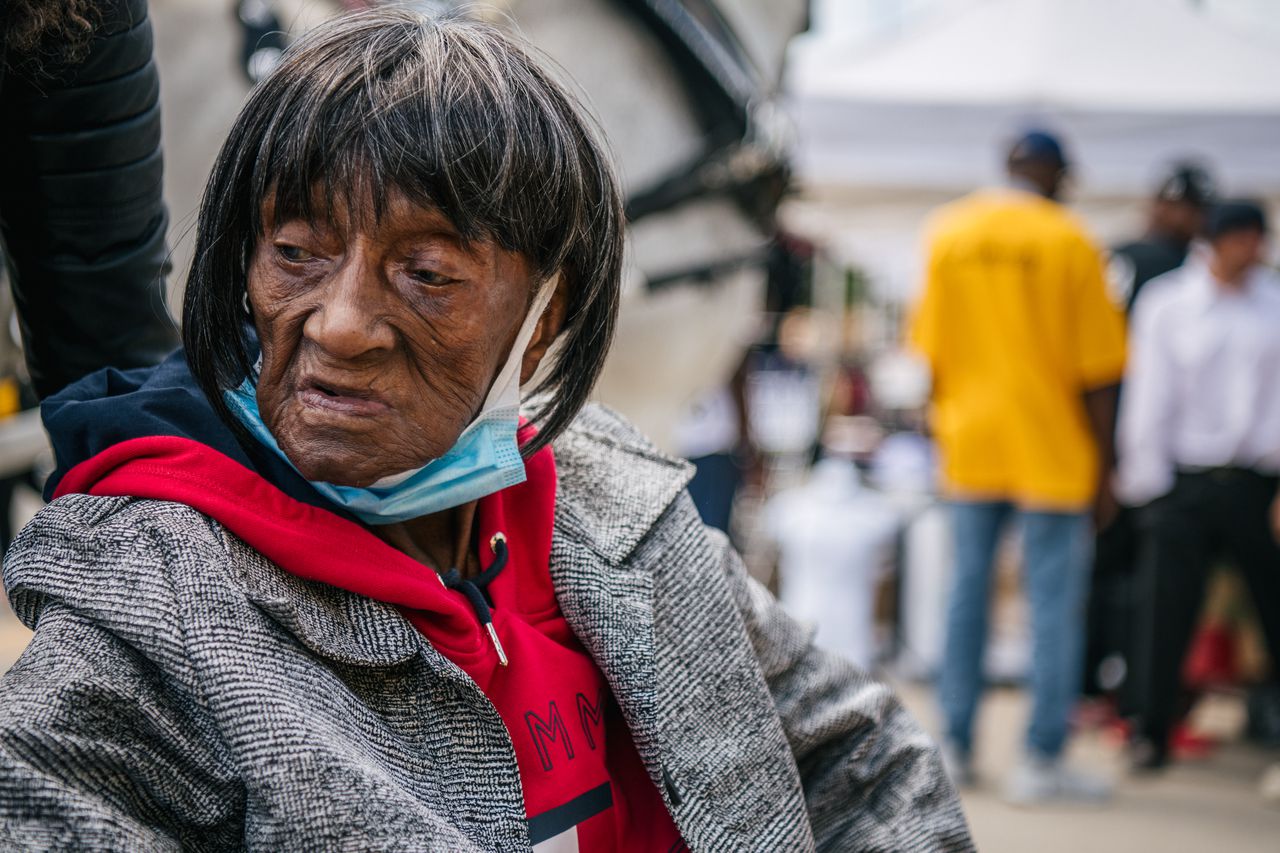âWe will not rest until there is justice for Greenwoodâ: 1921 Tulsa Race Massacre survivors vow to fight lawsuit dismissal
The legal team representing the remaining survivors of the 1921 Tulsa Race Massacre slammed Judge Caroline Wall for dismissing a lawsuit seeking reparations for Lessie Benningfield Randle, Viola Fletcher and Hughes Van Ellis. They called the decision a gut punch during a press conference on Monday.
Attorney Demario Solomon-Simmons, who represents Randle, Fletcher and Ellis, said that his team would be moving forward with an appeal.
“This is not a defeat. This is a hurdle,” Solomon-Simmons said Monday at the Historic Vernon AME Church, which sustained major damage during the Tulsa Race Massacre and had to be rebuilt. White mobs destroyed hundreds of buildings and homes and their actions resulted in as many as 300 deaths, to say nothing of the nearly 10,000 who were displaced in Greenwood.
Solomon-Simmons read a statement on behalf of Randle, Fletcher and Ellis, who were not in attendance:
“We will continue to fight until our last breathes… Despite Tulsa and America’s attempt to silence, change and gaslight the facts and truths of our collective racial history and trauma, we as survivors and all of those that believe in racial justice, we will now sit quietly or passively to allow mistruths or misjustices to persist. We will continue to fight… We will not rest until there is justice for Greenwood.”
The suit can no longer be refiled in Oklahoma’s courts due to Judge Caroline Wall’s decision. The justice, who considers herself a Constitutional Conservative, ultimately sided with arguments made by the regional chamber of commerce as well as other government entities.
Wall claimed that survivors sought “relief that violates the separation of powers provided by the Constitution of the State of Oklahoma.”
Tulsa Mayor G.T. Bynum was among the officials supportive of Wall’s decision, claiming that he “reject[s] the notion that the citizens of Tulsa have benefited from the 1921 Tulsa Race Massacre.”
“In this case, I don’t believe this generation of Tulsans is any better off, and, in fact, is worse off because of the 1921 Tulsa Race Massacre,” Bynum told Tulsa World.
Solomon-Simmons also called for a Department of Justice investigation under the Emmett Till Act to be conducted on behalf of the survivors.
The nonprofit Justice for Greenwood, which supports survivors and descendants of survivors of the Tulsa Race Massacre, also participated in the press conference.
In a prior statement, Justice for Greenwood lamented that “Judge Wall effectively condemned the three living Tulsa Race Massacre Survivors to languish — genuinely to death — on Oklahoma’s appellate docket.” Fletcher, the oldest living survivor, is 109 years old, while Randle is 108 and Ellis is 102.
Fletcher released a memoir last week about living through the massacre. Tilted “Don’t Let Them Bury My Story: The Oldest Living Survivor of the Tulsa Race Massacre In Her Own Words,” Fletcher details her firsthand account of fleeing Greenwood as a seven-year-old and how the massacre ultimately shaped the rest of her life. The book will be widely available Aug. 15.
Justice for Greenwood also condemned a recent comment from Oklahoma Superintendent Ryan Walters, who last week answered a question about teaching the massacre in schools without violating the states critical race theory ban. Walters initially said that the racism motivating the Tulsa Race Massacre should not be included in curriculum.
He later issued a statement clarifying that “history should be accurately taught” and that “the events on that day were racist, evil and inexcusable” but added that “kids should never be made to feel bad or told they are inferior based on the color of their skin.”
Attitudes like Walters’ may explain why the larger issue of distributing reparations for descendants of slaves remains inadequately addressed. Last year, the Pew Research Center found a drastic divide between white and Black Americans when it comes to supporting reparations. Just 18 percent of white Americans were supportive compared with 77 percent of Black Americans.
Cities and even entire states continue to move forward with reparation plans, including the State of California and separately San Francisco and Sacramento. More than a dozen cities in states across the country have formed reparations commissions. In 2021, Evanston, Illinois became the first city to begin distributing reparations to Black residents.
Andre Perry, who’s a senior fellow at the Brookings Institute and co-authored the research on “Why We Need Reparations for Black Americans,” believes local solutions such as the ones being pursued by Randle, Fletcher and Ellis are critical to righting the very clear wrong of systemic racism and tragedies like the Tulsa Race Massacre.
“The Tulsa Massacre puts the reparations debate in very concrete terms: You still have people who are alive, who deserve their government to restore them and the lack of restoration or reparation is to not acknowledge the ostensible crimes that were committed upon Americans because of their race,” Perry said.
“I believe that the solutions will come at the local level from all of these various efforts in different sectors, so housing, slavery and other injuries that were caused by discrimination. I think that a lot of the solutions that are emerging will eventually be reified into law and resourced at higher levels,” he added. “We don’t necessarily know or have all the solutions and all the fixes but they are certainly developing at this time.”
